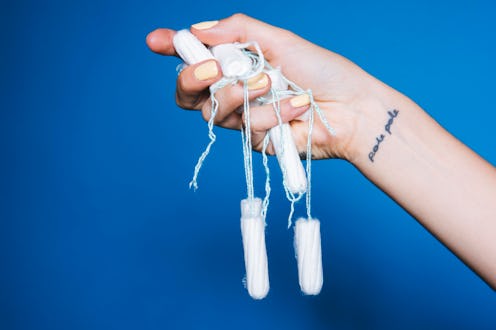Life
Not Being Able To Afford Period Products Can Have This Major Effect On Mental Health

Access to menstrual products can determine whether or not a person gets to attend school, or show up to work — it can influence a person's career direction and have lasting implications for their economic advancement. But according to a new survey conducted by hygienic company Always and OnePoll.com, the effects reach farther still. As the Telegraph reports, lack of access to period products puts those who experience it at greater risk for anxiety, depression, and financial hardship.
In a poll of 1,000 people with periods, 500 people reported that they had, at some point, lacked access to menstrual products. As a result, almost two thirds said their confidence had been dealt a blow by bullies at school, while 39 percent attested to living with anxiety and/or depression. More than a third said they had difficulty in social situations and on the whole, the people who'd experienced period poverty also experienced more difficulty conducting romantic relationships.
This group also seemed to have more trouble finishing school, and 44 percent of them said they had a hard time finding employment. Compared with respondents who did not have difficulty getting menstrual products, the period poverty camp was also more likely to accept the first job offer they received or take take a position simply because it "paid the bills," according to the Telegraph.
This makes sense: Period poverty doesn't exist in a vacuum. If a person can't afford pads, tampons, menstrual cups, what have you, they probably also have a hard time budgeting other basics.
"If someone is experiencing period poverty, there are likely other factors of poverty" at play, therapist Melanie Shapiro, a licensed independent clinical social worker with the Washington, D.C.-based practice, the Viva Center, tells Bustle. Those variables may include "lack of resources to food, shelter, clean water," she says, "which also contribute to feelings of anxiety and depression," or a feeling of hopelessness.
And globally, period poverty holds people back: Without products to manage menstruation, without clean and private facilities to use those products, people with periods are left with little recourse. In the UK, particularly, the relatively high cost of hygienic products means too many students simply stay home when they're bleeding, rather than risking their peers' running commentary when the blood spots start to show up. Too much missed school, though, and students end up repeating grades — and maybe not graduating at all. If the same pattern persists in their professional lives, they may find themselves passed over for promotions, or fired outright after too many absences.
The situation is no better in the United States, where poverty disproportionately affects women — who famously earn less than their male peers regardless — and food stamps don't cover menstrual products. So although Always surveyed people in the UK, there's no reason to expect the findings would look much different had the participant pool come from the U.S., with the same implications: A higher incidence of mental health issues.
"If a woman" — or anyone — "is unable to feel comfortable in her body and care for her physical health needs, she may experience overwhelming worry, self-consciousness and repeated thought looping — all symptoms of anxiety," Shapiro says. "Another effect of negative body image, and feeling discomfort in your body may be loss of self-esteem, one sign of depression."
And further, the isolation that often stems from period poverty — the having to stay home for two to seven days each month — can create feelings of social isolation, and degrade confidence.
"If a woman is menstruating and can’t afford menstrual products, it can be difficult to leave home and engage in everyday life activities," Shapiro says. That may leave a person feeling unproductive, lonely, and detached. It may also increase anxiety: "Missing work and decreased income is extremely anxiety provoking for women living in poverty," Shapiro says. "Any potential loss of income could lead to feelings of panic, fear and uneasiness all symptoms of anxiety."
All of which seems fairly intuitive — which only makes barriers like the tampon tax and the government's refusal to make menstrual management tools accessible all the more difficult to stomach. Widespread failure to treat hygienic products as a human right sets people with periods up to fail.
That's not to say they necessarily will, though. According to the Telegraph, people who reported period poverty also tended to have more aspirations at a young age — aspirations they went on to achieve, and at a younger age than those who did not have to overcome obstacles to menstrual hygiene. Just think what they could do if given free access to the health care they need.